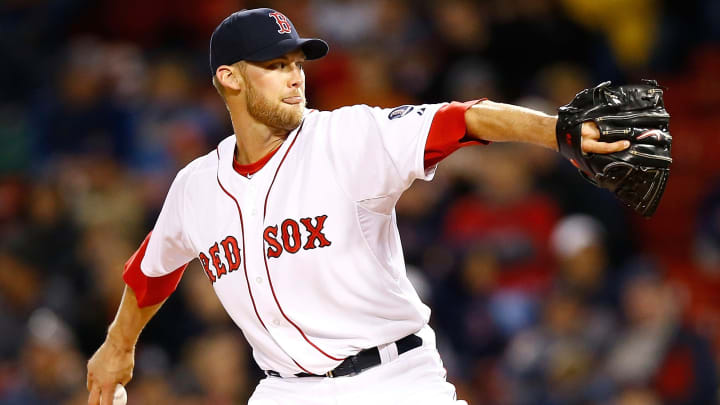An Ode to Daniel Bard: The Now-Retired Hurler Who Threw One of the Nastiest Pitches Ever

The career of former Red Sox reliever Daniel Bard—officially at an end today, according to him, but long ago finished—was full of promise but short on success. Two-plus seasons of exemplary relief work from 2009 through '11 that gave way to a rough few months spent as a starter in '12 followed by several years of bouncing from team to team in the minors. Injuries piled up along the way, his control vanished, and now his career is over. He last appeared on a major league mound in 2013, and by the end of his time in baseball, he was a gnarly car crash on the side of the road—teams slowed down, gawked, and moved on.
Bard's minor league numbers were appalling: 27 walks and 11 wild pitches in 15 1/3 innings in '13 with Boston; nine walks, seven hit batsmen and 13 (!) runs allowed against only two outs collected across four games in '14 with the Rangers' Class A team. He then vanished into the ether for two years; 13 walks, six wild pitches and five plunked batters upon his return in '16 with St. Louis, this time 31 years old and in high-A ball, facing hitters 10 years his junior. And finally, 24 walks in 9 1/3 innings last year split between the Cardinals and the Mets, the latter in Florida's Gulf Coast League, against kids fresh out of high school or graduated from Dominican summer leagues. His final line in his final game: nine batters faced, two retired, four walks, two hit by pitch, four runs allowed. That was it.
What Is Eric Hosmer Really Worth?
Given that statistical abattoir, why am I noting Bard's decision to call it quits? The same reason that general managers looked at those numbers, watched video of him struggling to throw strikes to 19-year-olds, and still picked up a phone to call his agent: the promise of what once was. Somewhere, underneath the walks and wildness, teams believed they could unearth the Daniel Bard who was a former first-round pick out of UNC, who threw 100 mph with ease, who shut down rallies and blew his fastball by hitters out of Boston's bullpen. If there were one thing on the minds of those front office executives as they threw Bard a minor league lifeline, it was probably the memory of this August 2010 outing against the Yankees, when he came in with the bases loaded and stranded everyone by making Derek Jeter and Nick Swisher look as if they'd been been playing dizzy bat before walking to the plate.
Watch that pitch to Swisher: a 99-mph fastball with changeup movement, like a reverse slider on full tilt. You and I have both seen swings that come up empty, swings that never had a chance to connect, swings that were misguided disasters. But Swisher's whiff is futility made flesh (or at least maple); he was so overmatched and flummoxed that he might as well have turned around and taken a cut in the other direction. It's a pitch so ludicrous, so hard to understand that the only explanation for it is some kind of magic. For a moment—a brief, tiny, incredible moment—Daniel Bard reached a level of performance that few can even imagine, much less get to. He slipped the surly bonds of Yankee Stadium and touched the face of Koufax.
Pitchers fail and break all the time; there's nothing new in that. And while the magnitude of Bard's collapse is staggering in its size, plenty of other hurlers before and after him have seen careers go up in smoke where once there looked to be nothing but brilliance. But before his descent into becoming a modern-day Steve Blass, Bard gave us that one moment, shining and perfect and eternal, in which he threw one of the nastiest, most unhittable pitches that the world has ever seen. Long after he's gone, I'll remember and thank him for that, and I hope that in life after baseball, he can find some measure of peace and happiness that equals that August day in the Bronx.

Jon Tayler is a writer for SI.com. His most prized possession is a Rich Garces rookie card.